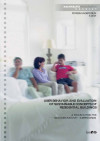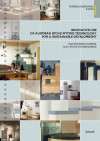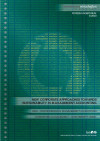Suchergebnisse
Factors which hinder and support the market introduction of innovative residential building concepts - an information offensive for planners and technology producers.

In order to actively increase the diffusion of innovative residential buildings, the results of currently available research were summarised to produce a "'diffusion campaign", directed at building planners, residential building contractors and selected technology producers.
Active transfer from "Building of tomorrow" Know How to the network "partner network sustainable construction Charinthia, nabaupool Charinthia"

Knowledge transfer from "Building of tomorrow" projects into the network "partner network sustainable construction Charinthia, nabaupool Charinthia" consisting of key actors of the building sector. Establishing a "Building of tomorrow" knowledge transfer centre Charinthia including infrastructure (Library) for all actors of the building sector. Conference and workshop with key actors (24.11.2006) taking place in Technologiepark Villach.
Development of a holistic valuation of enterprise-activities for sustainability and field test in leading industrial companies - InaBe
The development of a holistic model comprising method and instrument to evaluate ac-tivities from companies in context with sustainable development by integrating objective and subjective view.
Inter-linked design as a strategy towards sustainable buildings - removing deficiencies of learning and of diffusion

The aim is to investigate the role of inter-linked design team organisation in the design of sustainable buildings and to formulate ready-to-use recommendations and guidelines for dissemination.
Intelligent and green? User centred scenarios for information technology use in sustainable buildings

The project asked for the contribution of information technology use to the environmental performance of buildings - in terms of the vision of designers, practical use in existing projects and expectations of potential users.
User Behavior And Evaluation Of Sustainable Concepts Of Residentia Buildings

A Focus within the "HAUS DER ZUKUNFT" Subprogram
Forschungsforum
4/2001
Herausgeber: BMVIT
Englisch, 6 Seiten
Downloads zur Publikation
"eco fashion - fashion for the future" - Congress about ecological and social impacts of textile production
The project was intended to promote a change of image related to ecotextiles. A congress provided teachers and education experts with background information and tools for their work, thus leading to a sustainable transfer of knowledge in education.
Sustainability Research: Internationalisation of an existing Research Model for Sustainable Investment
The project's purpose was to adapt the existing rfu sustainability model for an improved international utilization. The developed elements (rating scale, sector structure, weighting model, etc.) have become content of several documents (description of the model, etc.) and instruments (Rating-Tool, Data Pool).
Criteria for Sustainable Urban Development - Tool for the Development and Assessment of urban brownfields

Based on experiences made with the projects "solarCity" and "Eco Building" resp. "Total Quality Assessment" the project will define qualitative and quantitative criteria for sustainable urban development considering Greater Linz as example.
Ways and means to increase the construction-volume by 500%, by means of standardised thermal restoration of old houses.

Development of practise-fit methods for intensification and rationalisation of processes in the field of restoration of one-and two-family houses built between 1945 and 1982 in Austria.
SIBAT - Ensuring indoor air quality of buildings - inclusion of toxicological criteria in the assessment of building materials

Development of a pragmatic assessment scheme applicable to building practice for the impact of building products on human health
Test stand method for the determination of system efficiency and emission factors of small-scale biomass combustion systems
Determination of key data with practical relevance of typical applications in only one test run. Monitoring of air pollutants and efficiency and continuous improvement of technology possible with test stand method.
Innovative Use Of Austrian Stove Fitting Technology For A Sustainabl Development

Tile stoves in Austria - Clay stoves in Zimbabwe
Forschungsforum
2/2000
Herausgeber: BMVIT
Englisch, 6 Seiten
Downloads zur Publikation
Assessment of user requirements and technical feasibility of lightweight applications based on renewables
Assessment of user requirements was studied. Furthermore, the technical feasibility of se-lected lightweight applications based on renewables in the furniture and interior design sector is investigated through involvement of all relevant stakeholders (panel manufacturers - further processing enterprises - distributors - consumers) in the value chain.
Environmental, Material Flow and Sustainability Management Accounting - Offensive diffusion in adult education
Diffusion of the "Factory of Tomorrow" project line on environmental and material flow cost accounting (EMA and MFCA) for corporate and national system boundaries, as well as related tools for sustainability accounting in existing post graduate studies.
Sustainability Reporting - Guidelines for Sustainability Reporting based on reporting processes of VA Technologie and Österreichische Bundesforste
Scientific attendance of sustainability reporting processes in two partner enterprises (VA Tech and ÖBf AG). Development of the guideline "Reporting about Sustainability" based on these practical experiences.
Total Quality Design and Assessment of buildings as a strategy to increase the level of know-how with regard to the issue of "sustainable buildings".

Total Quality Design and Assessment is an instrument to increase the demand for high quality buildings; "high quality" in terms of improved comfort as well as decrease in negative environmental impact, at affordable costs. Application of TQ design targets requires additional and new knowledge, thus increasing the level of know-how with regard to the issue of "sustainable buildings".
Practice Guide for Sustainable Building Sanitation and Modernisation within Construction Intents

A checklist considering priority, construction progress and actors is elaborated to serve a future-oriented selection of materials, energy carriers, design and construction within building sanitation, under a deliberate consideration of the involved actors from the construction branch
New Corporate Approaches Towards Sustainability In Management Accounting

EMA - Environmental Management Accounting Integrated Management - Cost-/Benefit Check
Forschungsforum
3/2003
Herausgeber: BMVIT
Englisch, 6 Seiten
